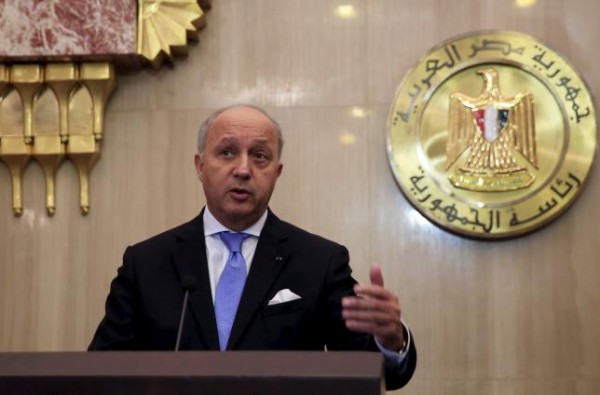
Fabius has said he would meet his Iranian counterpart Mohammad Javad Zarif on Monday to assess where Iran stands ahead of the final round of talks on its nuclear program, which begin later in the week.
“We need to be extremely firm, at the stage where we are now, things are still not clear,” Fabius said in talks with Israeli Prime Minister Benjamin Netanyahu.
Monday’s bilateral meeting, on the sidelines of an EU foreign ministers’ summit in Luxembourg, will be followed by a meeting between Zarif and all the European parties negotiating with Iran.
“Toward the end of next week the ministers will go (to the talks), so I’d like to have an explanation and conversation to see where the Iranians are,” Fabius told reporters in Cairo on Saturday, on the first day of the two-day Middle East visit.
In Luxembourg, Zarif will also be meeting with EU foreign policy chief Federica Mogherini and ministers from Britain and Germany on Monday to discuss the nuclear talks, an EU source said, calling it “a political meeting in the framework of ongoing negotiations.”
Iran reached a framework nuclear deal with the United States, Russia, China, France, Britain and Germany on April 2 in Lausanne. The parties are aiming for a final agreement by June 30 under which Iran would restrict its nuclear program in exchange for relief from economic sanctions.
France is deemed to have been one of the toughest in pressing for limits to prevent Iran acquiring an atomic bomb capability, although Tehran denies seeking nuclear weapons.
Netanyahu urged Fabius at their meeting on Sunday to “stand firm and prevent a bad deal” with Iran.
Israel has sharply criticized the emerging agreement as not going far enough to guarantee Tehran will not obtain a nuclear bomb nor barring Iran from continuing to arm Israel’s enemies, such as Hezbollah in Lebanon.
Fabius told reporters in Jerusalem: “I will see Iran negotiator tomorrow, but at the point where we are things are not clear. There is a need to clarify, make precise and ensure the deal is robust.”
Explosion
Fabius warned Sunday of an “explosion” in the absence of Israeli-Palestinian peace efforts , after Paris said it would propose a U.N. Security Council resolution to set a framework for negotiations.
The Palestinians have welcomed the initiative, hoping the international community will assume a greater role in resolving the conflict after more than two decades of failed U.S.-led peace efforts.
But Netanyahu said Sunday he would “fiercely reject” any international demands on the talks.
Palestinian officials and French diplomats say the proposal would call for basing the borders between Israel and a future Palestinian state on the lines that existed before the 1967 war, in which Israel captured the West Bank, east Jerusalem and the Gaza Strip. It also would set a two-year deadline for an agreement.
Israel rejects a return to its pre-1967 lines, saying they are indefensible, and does not want to set a deadline for an agreement.
“The most important thing for us is again to seek peace and security and the necessity to have two states,” Fabius said Sunday after meeting with Palestinian President Mahmoud Abbas. “Let’s take the lessons from the past and try to move forward.”
Fabius said he had spoken recently with Egypt’s president and Jordan’s king, and “they both told me the same thing, there is a great concern that if things continue to be frozen like this then an explosion could happen.”
Earlier on Sunday a Palestinian stabbed an Israeli police officer in Jerusalem’s Old City, who then shot the assailant, police said. Both men were wounded in the exchange.
On Friday, a Palestinian shot and killed an Israeli hiker in the West Bank.
At a press conference after meeting Fabius on Sunday evening, Netanyahu reiterated Israel’s demand that the Palestinians recognize it as a Jewish state. The Palestinians recognize Israel as a state, but have refused to recognize its religious character, fearing that doing so would undermine the rights of Israel’s Arab minority and demands for the return of Palestinian refugees.
REUTERS/AP

Leave a Reply
You must be logged in to post a comment.